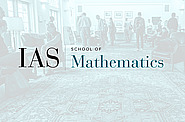Seminars Sorted by Series
Special Lectures in Analysis/Number Theory
Mar
27
2013
Special Lectures in Analysis/Number Theory
Mean Values of L-Functions for the Hyperelliptic Ensemble
Julio Andrade
3:45pm|West Bldg. Lecture Hall
Mar
27
2013
Special Lectures in Analysis/Number Theory
Statistics of the Zeros of the Zeta Function: Mesoscopic and Macroscopic Phenomena
Brad Rodgers
4:30pm|West Bldg. Lecture Hall
Special Logic/Number Theory Seminar
Sep
25
2007
Special Logic/Number Theory Seminar
How the Schanuel and Andre Conjectures Affect Logical Questions About the Real and Complex Exponentials and the Weierstrass Elliptic Functions
A. MacIntyre
4:00pm|S-101
Special Mathematical Physics Seminar
Dec
02
2004
Special Mathematical Physics Seminar
Supersymmetric Formulation of Network Models in Class C
John Cardy
11:00am|S-101
Mar
08
2006
Special Mathematical Physics Seminar
Entanglement in $XY$ Spin Chain and the Asymptotic Analysis of the Block Toeplitz Matrices
Alexander Its
2:00pm|S-101
Oct
27
2006
Special Mathematical Physics Seminar
Loop Calculus in Statistical Physics and Information Theory
Misha Chertkov
2:00pm|S-101
Apr
21
2010
Special Mathematical Physics Seminar
On Quantum Sigma Models With Non-Abelian Winding
Reimundo Heluani
4:00pm|S-101
Apr
28
2010
Sep
22
2010
Special Mathematical Physics Seminar
The Nonlinear Schroedinger Equation (NLSE) with a Random Potential: Effective Noise and Scaling Theory
Shmuel Fishman
4:00pm|S-101
Oct
26
2010
Special Mathematical Physics Seminar
A Stationary Phase Method for a Class of Nonlinear Equations
Yen Do
4:30pm|S-101
Apr
20
2011
May
10
2013
Special Mathematical Physics Seminar
Planar Ising Model: Discrete and Continuous Structures
Clement Hongler
2:00pm|S-101
Oct
22
2014
Special Mathematical Physics Seminar
Quasiperiodic operators with monotone potentials: sharp arithmetic spectral transitions and small coupling localization
Svetlana Jitomirskaya
4:00pm|S-101
Oct
04
2016
Jan
24
2017
Special Mathematical Physics Seminar
Reinforced random walks and statistical physics
Pierre Tarres
1:30pm
Special Mathematics Physics Seminar
May
15
2018
Special Members’ Seminar
Dec
13
2010
Special Members’ Seminar
Uniform Well-Posedness and Inviscid Limit for the Benjamin-Ono-Burgers Equation
4:15pm|S-101
Oct
14
2013
Special Members’ Seminar
Oct
14
2013
Special Mini-Course in Geometric PDE
Mar
09
2009
Special Mini-Course in Geometric PDE
Dirichlet Duality and the Nonlinear Dirichlet Problem Part I: For domains in R^n; Part II: On Riemannian Manifolds
H. Blaine Lawson, Jr.
3:30pm|S-101
Special Number Theory Afternoon
Apr
21
2023
Special Number Theory Afternoon
Counting Irreducible Integral Polynomials with Roots Approximating Configuration of Points
2:30pm|Simonyi 101 and Remote Access
Apr
21
2023
Special Number Theory Afternoon
Murmurations of Arithmetic L-functions
Andrew Sutherland
4:00pm|Simonyi 101 and Remote Access
Special Number Theory Seminar
Mar
30
2012
Apr
10
2013
Special Number Theory Seminar
Solvability in Polynomials of Pell Equations in a Pencil and a Conjecture of Pink
2:00pm|S-101
Mar
25
2014
Apr
01
2014
Special Number Theory Seminar
Statistical behavior of eigenforms on quaternion algebras
Paul Nelson
3:30pm|Fine 1201, Princeton University
Apr
08
2014
Special Number Theory Seminar
L-functions, sieves and the Tate Shafarevich group
3:30pm|Fine 1201, Princeton University
Jun
10
2014
Special Number Theory Seminar
Euler systems and the Birch-Swinnerton-Dyer conjecture
Sarah Zerbes
3:00pm|Fine 314, Princeton University
Jun
11
2014
Special Number Theory Seminar
Euler systems and bounds for Selmer groups
David Loeffler
3:00pm|Fine 314, Princeton University
Apr
06
2022
Special Number Theory Seminar
On the distribution of the Hodge locus
Emmanuel Ullmo
3:00pm|Simonyi Hall 101
Apr
05
2024
Special Number Theory Seminar
Expansion, Divisibility and Parity
Harald Helfgott
4:00pm|Simonyi 101 and Remote Access
Special Probability Seminar
May
10
2018
Special Probability Seminar
Percolation of sign clusters for the Gaussian free field I
Pierre-Francois Rodriguez
2:00pm|Simonyi Hall 101
May
11
2018
Special Probability Seminar
Percolation of sign clusters for the Gaussian free field II
Pierre-Francois Rodriguez
2:00pm|Simonyi Hall 101
Special Program Learning Seminar
Sep
21
2022
Special Program Learning Seminar
Time Change for Unipotent Flows and Rigidity
11:00am|Simonyi Hall 101 and Remote Access
Special Representation Theory Seminar
Mar
08
2017
Mar
08
2017
Special Representation Theory Seminar
On the role of rank in representation theory of the classical groups
Roger Howe
2:35pm
Special Seminar
Oct
01
2004
Feb
28
2005
Oct
07
2005
Oct
25
2005
Special Seminar
Nonuniformly Hyperbolic Attractors; Invertible and Noninvertible
M. Benedicks
3:15pm|S-101
Apr
19
2006
Special Seminar
Huygens' Principle and Hyperplane Configurations
A. P. Veselov
2:15pm|Fine Hall 314, Princeton University
Apr
04
2007
Special Seminar
Some Results in Differential Cohomology
Jim Simons, Renaissance Technologies
2:00pm|S-101
